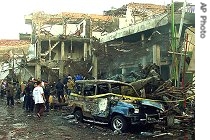-
(单词翻译:双击或拖选)
By Nancy-Amelia Collins
Jakarta
11 October 2006
 Police officers inspect the ruins of a nightclub destroyed by an explosion in Denpasar, Bali, in this Oct. 13, 2002 photo |
||
----
Jemaah Islamiyah has carried out a terrorist attack in Indonesia annually1 since 2002, when the group staged a double bombing on the island of Bali that killed 202 people.
Since then, J.I., as it is known, has been blamed for a series of bombings in Indonesia and the Philippines, including the 2003 suicide bombing of the Marriot Hotel in Jakarta, the 2004 bombing outside the Australian embassy in Jakarta, and more attacks in Bali in October 2005.
Jemaah Islamiyah, which has been linked to the al-Qaida terrorist organization, is the largest terror group operating in the region. It has been active in Indonesia, the Philippines, Malaysia and Singapore, and its stated aim is to create an Islamic state spanning the southern tier of Southeast Asian nations.
The Indonesian police have arrested more than 300 Muslim militants4 since the first Bali bombing, prosecuting5 and jailing most of them. Several of these men are now on death row.
But despite those arrests, and the death last year of J.I. leader Azahari bin2 Hussein in a shoot-out with police in Central Java, security experts and the government say the threat of another attack is still very real. Among other reasons, Noordin Top, another J.I. leader and one of Southeast Asia's most wanted terrorists, is still at large.
Sidney Jones, director of the International Crisis Group's office in Indonesia, and an expert on Jemaah Islamiyah, says the organization is weakened and splintered, but not defeated.
"I think we are seeing a regeneration of the mainstream6 Jemaah Islamiyah. Not so much with the idea of bombing Western targets in mind, but with the idea of reviving and reconsolidating this as an organization," she said. "I think we are dealing7 with a very resilient organization."
Jones says it is not clear what the group's new objectives or strategy might be.
"There is a large focus on the need for military preparation, even within this group that's not concerned with bombing," she said. "And the question is, what are the objectives and what is this organization going to do with the military training or preparations that they get?"
Major General Ansyaad Mbai, Indonesia's top anti-terror official, also says the government has made a lot of progress against terrorism, but he says law enforcement alone will not end the threat.
"Because terrorism is a politically and ideologically8 motivated movement, therefore, counter-terrorism cannot count on raw force or hard power to suppress its development," he said. "Our experience therefore shows that the arrest, detention9, trials, including death sentences, even military operations, do nothing to stop terrorism."
Instead, Ansyaad says, the government has started a program to educate the public, in part through television, in the hope of undermining Jemaah Islamiyah's efforts to recruit new members.
He says the program targets individuals in what he calls the "radical10 movement" who have denounced violence and are willing to work with the government.
Other efforts involve television programs run by moderate Islamic clerics who urge the faithful to follow Islam in a peaceful manner.
At least one former militant3 says Jemaah Islamiyah's chances of recruiting large numbers of people have already been doomed11 by the group's own actions.
Nasir Abbas, a former J.I. leader, is the brother-in-law of Muklas, one of the masterminds of the 2002 Bali bombing. Nasir trained in Afghanistan, and established a militant training camp in the southern Philippines.
He says he opposed the plan to carry out the first Bali attack, because he believes it is unacceptable to kill innocent civilians12.
After he was arrested in Indonesia in 2003, Nasir says he decided13 to cooperate with the government in its fight against J.I.
"What they did is killing14 the civilians, killing unarmed people, killing non-military people," he said. "This is something I can say that is not war, that is not battle, that is not jihad, but that is a mass kill, a mass killing operation. They ruin the movement of Jemaah Islamiyah."
Indonesia is a secular15, democratic nation with the world's largest Muslim population. Most people practice a moderate form of Islam. As a result, Nasir thinks the killing of innocent people - Jemaah Islamiyah's primary activity - has destroyed any chance of the group gaining mass support among the public.
 收听单词发音
收听单词发音
1
annually

|
|
| adv.一年一次,每年 | |
参考例句: |
|
|
|
2
bin

|
|
| n.箱柜;vt.放入箱内;[计算机] DOS文件名:二进制目标文件 | |
参考例句: |
|
|
|
3
militant

|
|
| adj.激进的,好斗的;n.激进分子,斗士 | |
参考例句: |
|
|
|
4
militants

|
|
| 激进分子,好斗分子( militant的名词复数 ) | |
参考例句: |
|
|
|
5
prosecuting

|
|
| 检举、告发某人( prosecute的现在分词 ); 对某人提起公诉; 继续从事(某事物); 担任控方律师 | |
参考例句: |
|
|
|
6
mainstream

|
|
| n.(思想或行为的)主流;adj.主流的 | |
参考例句: |
|
|
|
7
dealing

|
|
| n.经商方法,待人态度 | |
参考例句: |
|
|
|
8
ideologically

|
|
| adv. 意识形态上地,思想上地 | |
参考例句: |
|
|
|
9
detention

|
|
| n.滞留,停留;拘留,扣留;(教育)留下 | |
参考例句: |
|
|
|
10
radical

|
|
| n.激进份子,原子团,根号;adj.根本的,激进的,彻底的 | |
参考例句: |
|
|
|
11
doomed

|
|
| 命定的 | |
参考例句: |
|
|
|
12
civilians

|
|
| 平民,百姓( civilian的名词复数 ); 老百姓 | |
参考例句: |
|
|
|
13
decided

|
|
| adj.决定了的,坚决的;明显的,明确的 | |
参考例句: |
|
|
|
14
killing

|
|
| n.巨额利润;突然赚大钱,发大财 | |
参考例句: |
|
|
|
15
secular

|
|
| n.牧师,凡人;adj.世俗的,现世的,不朽的 | |
参考例句: |
|
|
|















